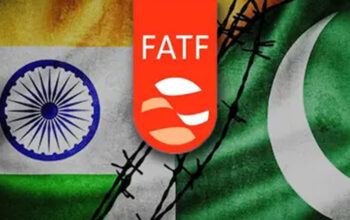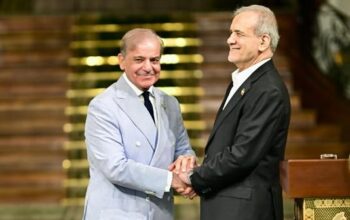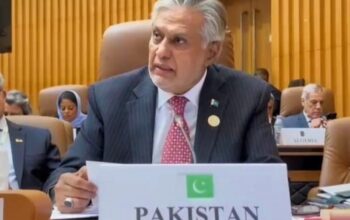By Staff Reporter
ISLAMABAD: Pakistan has appealed to global powers for “intervention” to address its deepening rift with arch-rival India, a plea delivered Sunday by a high-level diplomatic delegation after touching down in London to drum up international support.
The delegation, headed by former foreign ministers Bilawal Bhutto-Zardari, Hina Rabbani Khar, and Khurram Dastgir, comprises senators and seasoned diplomats including senators Sherry Rehman, Musadik Malik, Faisal Subzwari, and Bushra Anjum Butt, alongside senior envoys Jalil Abbas Jilani and Tehmina Janjua.
Their London stop follows visits to the United States and precedes a planned trip to Brussels, part of a broader push to offset India’s diplomatic clout.
Speaking to a local TV channel upon arrival in the United Kingdom, Dastgir highlighted the urgency of global involvement despite a recent US-mediated ceasefire.
“The resistance we faced is that the Americans think that since President Trump has mediated the ceasefire, there is no need for further intervention. This was exactly our mission: to make them understand that intervention is needed,” he said. “We’re here to make clear that more intervention is essential.”
He acknowledged a U.S.-brokered ceasefire but argued it falls short, warning that India’s positions on water rights and other disputes risk igniting “a war in the subcontinent” and warned of dire consequences if dialogue falters.
“If India does not come to the table for talks again, then due to [the water issue] and India’s irresponsible behavior, saying that it does not need evidence for a war, a war in the subcontinent is certain,” he added, asserting that the delegation had successfully conveyed its message.
The campaign kicked off at the United Nations in New York on June 4, where the delegation, headed by Bhutto-Zardari, met with Secretary-General Antonio Guterres and members of the UN Security Council. From there, the team traveled to Washington, engaging with key US lawmakers, including the chairman of the House Foreign Affairs Committee, as well as policy experts at various think tanks.
A separate Pakistani delegation, led by Special Assistant to the Prime Minister Syed Tariq Fatemi, visited Moscow from June 2 to 4, holding talks with Russian Foreign Minister Sergey Lavrov and a senior aide to President Vladimir Putin.
A Nuclear Standoff and a Plea for Peace
At the heart of Pakistan’s appeal is the specter of two nuclear-armed neighbors locked in a perilous standoff. “We want global powers to tell India that two neighboring nuclear states cannot move forward in such a dangerous environment. It is not just damaging for the region but for the world’s peace,” Senator Faisal Subzwari told a local TV channel.
Yet he emphasised Pakistan’s intent, saying, “despite showing our military prowess, we have come with an invitation to peace”.
Sherry Rehman, a former Pakistani ambassador to the United States, described the delegation’s reception as “very positive.” “They understood our points and the risks,” she said of the international response. Rehman pointed to India’s actions in occupied Kashmir, which she called “the largest open-air prison after Gaza,” and criticized New Delhi’s suspension of the Indus Waters Treaty (IWT) following a deadly attack in the region.
“They all also agreed that the weaponization of water is extremely wrong,” she noted. With a wry nod to India’s parallel efforts, she added, “Whatever the Indians do, good luck to them.”
Senator Bushra Anjum Butt hailed the response in New York and Washington as “fantastic,” particularly on issues like Kashmir and the IWT, a decades-old pact governing water sharing that India unilaterally shelved after the attack. “If the Indus Waters Treaty is overlooked today, then no treaty in the future will stand any ground,” Butt warned.
Former caretaker foreign minister Jalil Abbas Jilani distilled the delegation’s core message. “India committed aggression and Pakistan is a peaceful country.” He reaffirmed Islamabad’s commitment to resolving the longstanding disputes through dialogue.
Pakistan’s leaders have signaled a desire for greater U.S. involvement. Prime Minister Shehbaz Sharif this week praised former President Donald Trump as a “man of peace,” while Bhutto-Zardari suggested that “an American role in arranging a comprehensive dialogue would also be beneficial for us.”
India, meanwhile, has also mounted its own diplomatic push. On June 5, an Indian delegation met with US Vice President JD Vance, capitalising on his ties to India. Led by Congress MP Shashi Tharoor, the team includes a cross-section of political voices.
Rehman dismissed India’s efforts as unfocused. “India’s delegation does not know what its mission is, except for maligning Pakistan,” she said. “We did not go [to the U.S.] to malign India, but to tell Pakistan’s story.”
Copyright © 2021 Independent Pakistan | All rights reserved




